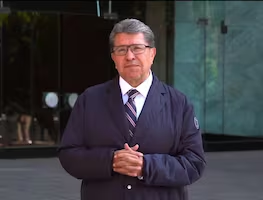Más Información

Inicia pago de la Pensión del Bienestar del bimestre enero-febrero; estas son las fechas de depósito

Violencia en el país evidencía colapso de estrategia de seguridad: PRI; insiste en cambiar el rumbo de combate

Defensa toma protesta al general Maximiliano Cruz Ramos; fungirá como Inspector y Contralor General de División de Estado Mayor

Sheinbaum destaca reducción de homicidios dolosos en último mes de 2024; “Confiamos en nuestra estrategia”, dice

Sheinbaum no hablará de seguridad en reunión con presidentes municipales; revisarán tema de infraestructura

Monreal reitera apoyo a Sheinbaum para este 2025; “la conducción del país está en buenas manos”, dice
After the proposal of the Minister of Tourism, Enrique de la Madrid , of legalizing marijuana in tourist destinations to reduce violence rates, the governors of the states where tourism is one of the main engines of local economy state their opinion on the matter.
Jalisco, Guerrero, Quintana Roo, Baja California Sur, Sinaloa, and Baja Caifornia are the six Mexican states with the main toruist destinations for foreign tourists.
In favor
The Governor of Jalisco , Aristóteles Sandoval, claimed it's the illegal status of matijuana – not its use – what is killing Mexico's youth. Thus, he proclaimed himself in favor of legalizing marijuana not only for recreational use at tourist hotsports but across the nation.
“I've honestly haven't heard of anyone who has died for consuming marijuana,” he said.
In Guerrero , Governor Héctor Astudillo believes marijuana should be legalized first for medicial purposes and then for receational use.
“I respect the Minister's position but ours arises from our circumstances, of the violence in our state,” he asserted. However, the spokesman of the organization Coordination Group Guerrero, Roberto Álvarez, claims marijuana is not the drug spiking violence in Guerrero, rather, the poppy cultivation and production.
Against
In Baja California , one of the main destinations of U.S. tourists in Mexico, Governor Francisco Vega said that before legalizing drug use, the Federal Government jointly with local governments, should first develop a strategy to implement a sound public policy to address addiction as a health problem.
“I'm against drug legalization, especially because we don't have a federal public policy to provide medical attention to the sick because addiction is a disease,” he said.
Meanwhile to the south, Baja California Sur Governor, Carlos Mendoza, stated he was against legalization but that this was a good time to discuss the issue.
“Although I'm initially against legalization, I have to admit it seems senseless and illogical to carry on with a fight as part of a strategy that is costing us lives in Mexico when, magically upon crossing the border, this specific drug becomes legal,” he explained.
Undecided
In Quintana Roo , Governor Carlos González expressed his desire to have the proposal analyzed to know whether marijuana legalization would bring as a result social harmony and security without endangering public health.
“I think this is an initiative we have to review and analyze; there are indeed some things [De la Madrid] has said that I agree with but we also need to make sure this won't have a negative impact on public health. More than being in favor, I'm in favor of reviewing the matter thoroughly so we can find a solution that can bring us peace. Initially, it seems it can,” he claimed.
Governor Quirino Ordaz, of Sinaloa , shares Mr. González's point of view.
“We'll have to review the proposal and remain open to debate; all which can strengthen and help will always be welcome but it needs to be studied.”
am




